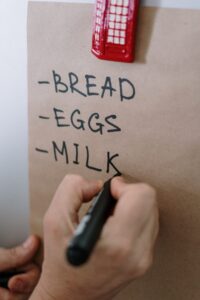 Before you go shopping, plan your meals and make a list so you buy only what you need.
Before you go shopping, plan your meals and make a list so you buy only what you need.
A quarter of a standard mug of uncooked rice or two generous handfuls of uncooked pasta per person are a good rule of thumb when estimating quantities required.
Bread is best stored in its original packaging in a cupboard or bread bin, not the fridge where it goes stale more quickly. Potatoes should be kept in a breathable bag/sack (not plastic packaging) and stored in a cool, dark place.
Set your fridge to 5 degrees Celsius to keep food fresher for longer. All kinds of foods can also be frozen on their “use-by” date, including milk and bread.
‘Best before’ refers to quality: your food will be at its best before the date given. After this date, it will still be safe to eat. ‘Use by’ refers to safety: you must not eat food past the ‘use by’ date.
Use every edible part of your fruit and vegetables, including broccoli stalks and cooked potato skins.
Leftovers could make a lunchtime snack e.g. for fillings in sandwiches or baked potatoes, or to make an evening meal.
Consider home composting, and make sure you use your weekly Food Waste kerbside collection.

